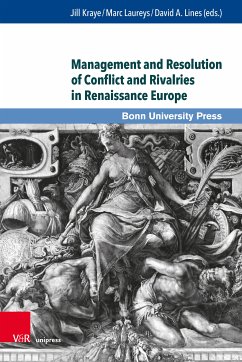This is the third and final volume of essays issuing from the Leverhulme International Network 'Renaissance Conflict and Rivalries: Cultural Polemics in Europe, c. 1300-c. 1650'. The overall aim of the network was to examine the various ways in which conflict and rivalries made a positive contribution to cultural production and change during the Renaissance. The present volume, which contains papers delivered at the third colloquium, draws that examination to a close by considering a range of different strategies deployed in the period to manage conflict and rivalries and to bring them to a positive resolution. The papers explore these developments in the context of political, diplomatic, social, institutional, religious, and art history. Dr. Jill Kraye ist Emeritus Professor of the History of Renaissance Philosophy an der University of London und Honorary Fellow am Warburg Institute.
Dieser Download kann aus rechtlichen Gründen nur mit Rechnungsadresse in A, B, BG, CY, CZ, D, DK, EW, E, FIN, F, GR, H, IRL, I, LT, L, LR, M, NL, PL, P, R, S, SLO, SK ausgeliefert werden.
Hinweis: Dieser Artikel kann nur an eine deutsche Lieferadresse ausgeliefert werden.









